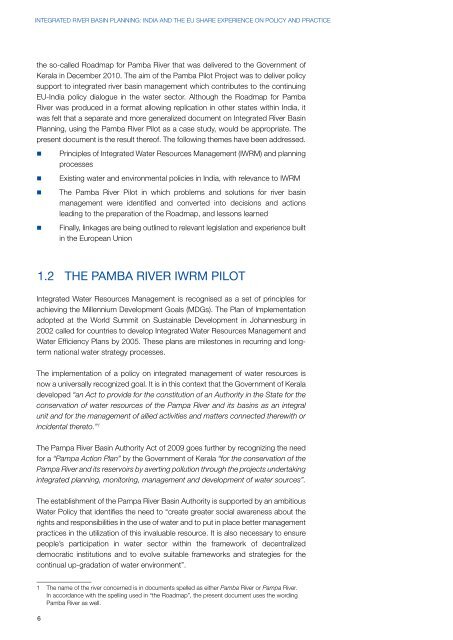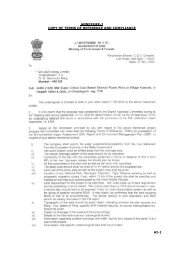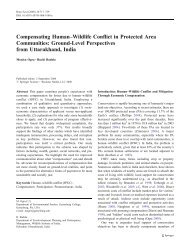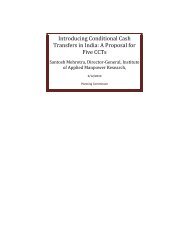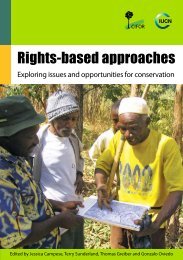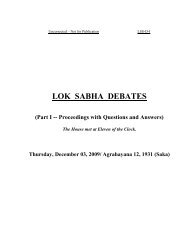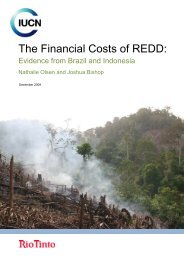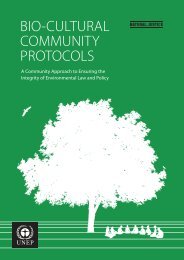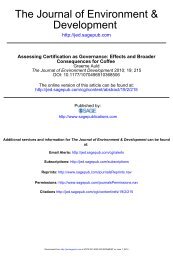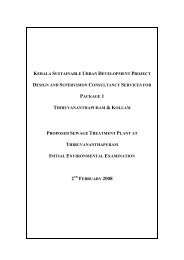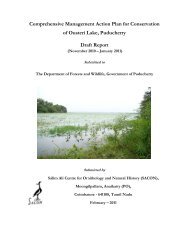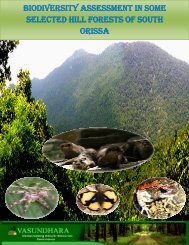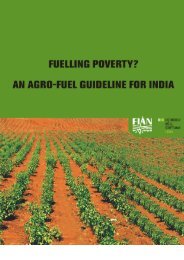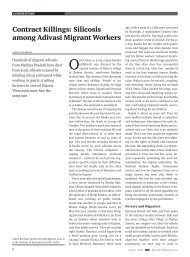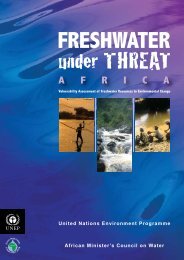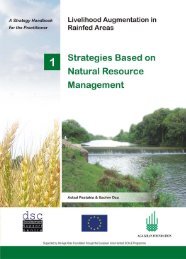Integrated River Basin Planning – Replicable ... - India Water Portal
Integrated River Basin Planning – Replicable ... - India Water Portal
Integrated River Basin Planning – Replicable ... - India Water Portal
You also want an ePaper? Increase the reach of your titles
YUMPU automatically turns print PDFs into web optimized ePapers that Google loves.
<strong>Integrated</strong> <strong>River</strong> <strong>Basin</strong> <strong>Planning</strong>: <strong>India</strong> and the EU share experience on policy and practice<br />
INTRODUCTION<br />
the so-called Roadmap for Pamba <strong>River</strong> that was delivered to the Government of<br />
Kerala in December 2010. The aim of the Pamba Pilot Project was to deliver policy<br />
support to integrated river basin management which contributes to the continuing<br />
EU-<strong>India</strong> policy dialogue in the water sector. Although the Roadmap for Pamba<br />
<strong>River</strong> was produced in a format allowing replication in other states within <strong>India</strong>, it<br />
was felt that a separate and more generalized document on <strong>Integrated</strong> <strong>River</strong> <strong>Basin</strong><br />
<strong>Planning</strong>, using the Pamba <strong>River</strong> Pilot as a case study, would be appropriate. The<br />
present document is the result thereof. The following themes have been addressed.<br />
• Principles of <strong>Integrated</strong> <strong>Water</strong> Resources Management (IWRM) and planning<br />
processes<br />
• Existing water and environmental policies in <strong>India</strong>, with relevance to IWRM<br />
• The Pamba <strong>River</strong> Pilot in which problems and solutions for river basin<br />
management were identified and converted into decisions and actions<br />
leading to the preparation of the Roadmap, and lessons learned<br />
• Finally, linkages are being outlined to relevant legislation and experience built<br />
in the European Union<br />
1.2 The Pamba <strong>River</strong> IWRM Pilot<br />
<strong>Integrated</strong> <strong>Water</strong> Resources Management is recognised as a set of principles for<br />
achieving the Millennium Development Goals (MDGs). The Plan of Implementation<br />
adopted at the World Summit on Sustainable Development in Johannesburg in<br />
2002 called for countries to develop <strong>Integrated</strong> <strong>Water</strong> Resources Management and<br />
<strong>Water</strong> Efficiency Plans by 2005. These plans are milestones in recurring and longterm<br />
national water strategy processes.<br />
The implementation of a policy on integrated management of water resources is<br />
now a universally recognized goal. It is in this context that the Government of Kerala<br />
developed “an Act to provide for the constitution of an Authority in the State for the<br />
conservation of water resources of the Pampa <strong>River</strong> and its basins as an integral<br />
unit and for the management of allied activities and matters connected therewith or<br />
incidental thereto.” 1<br />
The Pampa <strong>River</strong> <strong>Basin</strong> Authority Act of 2009 goes further by recognizing the need<br />
for a “Pampa Action Plan” by the Government of Kerala “for the conservation of the<br />
Pampa <strong>River</strong> and its reservoirs by averting pollution through the projects undertaking<br />
integrated planning, monitoring, management and development of water sources”.<br />
The establishment of the Pampa <strong>River</strong> <strong>Basin</strong> Authority is supported by an ambitious<br />
<strong>Water</strong> Policy that identifies the need to “create greater social awareness about the<br />
rights and responsibilities in the use of water and to put in place better management<br />
practices in the utilization of this invaluable resource. It is also necessary to ensure<br />
people’s participation in water sector within the framework of decentralized<br />
democratic institutions and to evolve suitable frameworks and strategies for the<br />
continual up-gradation of water environment”.<br />
1 The name of the river concerned is in documents spelled as either Pamba <strong>River</strong> or Pampa <strong>River</strong>.<br />
In accordance with the spelling used in “the Roadmap”, the present document uses the wording<br />
Pamba <strong>River</strong> as well.<br />
IWRM provides the means of balancing and meeting the needs for use of water<br />
resources to ensure equitable and sustainable use of the water resource. It is based<br />
on the principle that, in order to maximise the benefits of the water resource and to<br />
ensure equitable use of water, all water use and discharges in the catchment need<br />
to be balanced. In achieving this, the following results were aimed at:<br />
• increased awareness on the importance of an environmental approach and<br />
considerations in IWRM;<br />
• increased access to relevant IWRM information and tools;<br />
• targeted training for key managers and decision makers in the water sector;<br />
• development of a Roadmap for the implementation of IWRM concepts in<br />
future planning processes;<br />
• guide the Pamba <strong>River</strong> <strong>Basin</strong> Authority to spearhead the implementation of<br />
IWRM plans and inclusion of IWRM in decision making;<br />
• prospect for implementation of a baseline study for the development of an<br />
IWRM Action Plan by local specialized organisations; and<br />
• documentation on best practices, case studies and guidelines to enhance<br />
replication.<br />
The Pamba Pilot Project strived to promote and support this process by guiding<br />
and giving support to the development and implementation of an IWRM plan for the<br />
Pamba <strong>River</strong> <strong>Basin</strong> by developing a Roadmap towards this purpose. The project<br />
respected the widely acknowledged approach that IWRM, based on effective<br />
stakeholder engagement, provides a direct link to MDGs, addressing poverty,<br />
hunger, gender equality, health, education and environmental degradation.<br />
The pilot project has encouraged and used a participative approach to develop<br />
identification of issues and outcomes to formulate and establish consensus<br />
on visions, strategies, outputs, activities and external factors for the different<br />
components of the project, as well as formulating and identifying the various factors<br />
influencing the long-term sustainability of the programme. Workshop facilitation was<br />
provided by APSF-TA team members and qualified water management experts.<br />
To promote joint ownership of this work, stakeholders were motivated to act upon<br />
the conclusions and recommendations during a final event organized by the APSF<br />
team to expose and discuss identified actions and recommendations based on<br />
analysis of outcomes assembled throughout the Pilot Project.<br />
At the beginning of the project, the Consultant developed an overall Stakeholder<br />
Involvement Plan (SIP), which started with a stakeholder mapping exercise. The SIP<br />
tackled involvement of stakeholders on the regional and local level for the duration<br />
of the project. The SIP was produced with the aim to including specific objectives<br />
for stakeholder participation at the different project stages; assure appropriate levels<br />
of participation for the various target groups (information provision, consultation,<br />
or active involvement); and establish needs and characteristics of each working<br />
session.<br />
The Pamba Pilot Project has been implemented through six workshops guiding the<br />
participants through a process of identifying the main issues related to water as<br />
well as the main issues related to the management of water resources by different<br />
institutions. Analysis was conducted taking the Pamba <strong>River</strong> <strong>Basin</strong> as one single<br />
6 7


